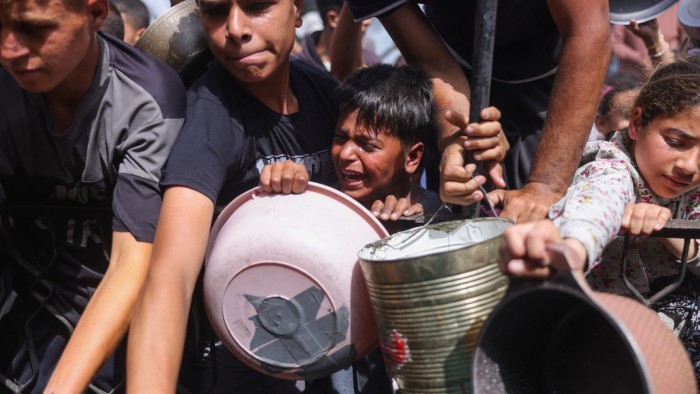Unlock the Editor’s Digest for free
Roula Khalaf, Editor of the FT, selects her favourite stories in this weekly newsletter.
Benjamin Netanyahu said Israel plans to take over all of Gaza as the country escalates its offensive in the war-torn enclave, pounding the strip with air strikes and issuing an evacuation order for one of its largest cities.
The Israeli military on Monday told all residents of the southern city of Khan Younis — the territory’s second-biggest before the war — to leave, demanding they move west to the so-called al-Mawasi “humanitarian zone” ahead of what it called an “unprecedented attack” on the city.
The aim of the expanded Israeli campaign was “to take over all of the territory of Gaza” in a bid to fully defeat Hamas, Netanyahu said in a video on Monday.
Israel — which officially launched the new offensive over the weekend — has mobilised two additional infantry and armour divisions to the territory, taking the total number to five.
Local reports indicated that an undercover Israeli special forces team, dressed as civilian refugees, had early on Monday infiltrated Khan Younis and targeted a leading militant. The Israel Defense Forces said they were aware of the reports but added that there was “no change in the situational assessment”.
The expanded military operations came alongside the imminent reintroduction of aid, which the Israeli premier said was necessary to maintain international legitimacy.
Netanyahu, whose government on Sunday night approved the re-entry of limited amounts of food into the enclave after a two-month siege, acknowledged for the first time that Gazans were on the brink of starvation.
“We’re quickly getting close to the red line [of starvation], to a situation where we can lose control and then everything crumbles,” said Netanyahu on Monday, adding that international pressure — including from the US — had forced the country to ease its blockade.
The prime minister said he was told by Israel’s “friends” across the world and in the US Congress that “we will not accept pictures of mass starvation . . . We won’t be able to support you” in the war effort.
The Trump administration, which has staunchly supported Israel’s war aims, has in recent days warned of the grim humanitarian conditions inside Gaza, with the US president’s envoy Steve Witkoff telling ABC on Sunday that the US would not let a crisis “occur on President Trump’s watch”.
A person familiar with Gaza humanitarian issues said the UN and its agencies on Sunday night were told to prepare for the entry of significant amounts of aid trucks into the enclave, along the lines of a UN-led model that has been in place since the start of the war in October 2023.
The UN’s Office for the Coordination of Humanitarian Affairs said on Monday that it had “been approached by Israeli authorities to resume limited aid delivery”.
“We are in discussions with them now on how this would take place given the conditions on the ground,” it said.
The premier declined to hold a vote in his security cabinet on the decision to resume aid, fearing that the motion would not be carried in a sign of the contentious domestic politics surrounding aid provision to Gaza.
Israeli officials have consistently claimed that humanitarian supplies are being siphoned by Hamas.
Bezalel Smotrich, the ultranationalist finance minister who had previously threatened to resign from the government if it re-allowed aid, said on Monday that he backed the premier but again insisted “no aid will go into Hamas, period”.
Netanyahu said on Monday that a controversial Trump-backed scheme — in which a little-known Swiss-incorporated group, the Gaza Humanitarian Foundation, would distribute aid under the supervision of the Israeli military and private security contractors — would “take time” to build.
“A minimal, basic bridge” was required “so that there will not be starvation in Gaza”, he said.
The expanded offensive came as US, Egyptian and Qatari mediators in Doha attempt to broker a renewed ceasefire between Israel and Hamas.
Netanyahu has previously said he will only “negotiate under fire” with the militant group, in a bid to secure the release of 58 remaining hostages taken from Israel by Hamas during its October 7 2023 attack, around 20 of whom are believed to be alive.
But the Israeli leader has been clear that he will not end the war until “total victory” is achieved over Hamas, including the disarmament of the group and the exile of its leadership.
Additional reporting by Malaika Kanaaneh Tapper
Read the full article here




